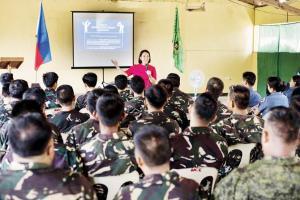The training, which is delivered free-of-charge to groups who request it, provides an overview of how fake news works as well as techniques to spot and debunk it

The training provides an overview of how fake news works as well as techniques to spot and debunk it. Pic/AFP
A room full of Filipino police and soldiers stares intently at headlines projected on a screen, the latest students of a media bootcamp aimed at fighting their nation's flood of fake news. Scores of people ranging from girl scouts to government workers have already received the same innovative instruction in the Philippines, ranked the world's top user of social media.
ADVERTISEMENT
"Which one is real?" asks class teacher Rowena Paraan, a veteran journalist with the top Philippine TV network ABS-CBN, as she stands in a sweltering gym on a military base. Her lesson is part of the channel's long-running citizen journalism training programme, which since late-2016 has shown some 25,000 people how to fight the fake news spike that accompanied President Rodrigo Duterte's rise.
The training, which is delivered free-of-charge to groups who request it, provides an overview of how fake news works as well as techniques to spot and debunk it. It is one of several similar efforts that have sprouted up since Duterte's election, including one run by the news website Rappler, known for battling with the president over his brutal drugs war.
25k
No. of people who have participated in the camp
Catch up on all the latest Crime, National, International and Hatke news here. Also download the new mid-day Android and iOS apps to get latest updates
This story has been sourced from a third party syndicated feed, agencies. Mid-day accepts no responsibility or liability for its dependability, trustworthiness, reliability and data of the text. Mid-day management/mid-day.com reserves the sole right to alter, delete or remove (without notice) the content in its absolute discretion for any reason whatsoever
 Subscribe today by clicking the link and stay updated with the latest news!" Click here!
Subscribe today by clicking the link and stay updated with the latest news!" Click here!







